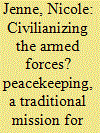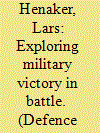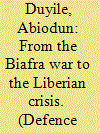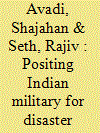|
|
|
Sort Order |
|
|
|
Items / Page
|
|
|
|
|
|
|
| Srl | Item |
| 1 |
ID:
171641


|
|
|
|
|
| Summary/Abstract |
Peacekeeping is widely believed to introduce a civilian element into military culture. However, empirical tests of whether peacekeeping actually yields civilianizing effects on the armed forces are few. Based on the case of Chile, I argue that participation in peacekeeping has failed to lead to fundamental changes in the military’s role perception vis-à-vis civilian actors, despite some practical learning experiences at the individual level. Peacekeeping has been assimilated into the existing warrior model, where civilian actors play only a secondary role.
|
|
|
|
|
|
|
|
|
|
|
|
|
|
|
|
| 2 |
ID:
171644


|
|
|
|
|
| Summary/Abstract |
This study examines simulated battle settings, to analyze how tactics are performed and victory is achieved by observing tacticians dueling in wargames. In contemporary warfare, victory in battle relates to a wide variety of elements. According to military theory, these elements commonly involve deployment, reconnaissance, manoeuvre, breakthrough, tempo, surprise, exploitation, and shock, resulting in enemy organizational breakdown. Ideally, if one side in combat exploits all elements successfully, the likelihood of victory increases. Although the use of the tactical elements is not always obvious to the participants, the study indicates a correlation between using the elements and victory in a wargame setting. Although wargames inherent bias by not being the real world, they are used in training, education and analysis worldwide. The study also illustrates that the participants view tactical victory differently in battle.
|
|
|
|
|
|
|
|
|
|
|
|
|
|
|
|
| 3 |
ID:
171643


|
|
|
|
|
| Summary/Abstract |
The sea has increased in importance as a source of useful resources. The nation that has control of its immediate and external seas is in a good position to choose how much or how little of sea resources it wants. It is the importance of the sea and the sea lines of communication to nations that has made thoughts such as maritime power, sea power, naval strategy … etc significant to them. The paper also examined the naval and constabulary relevance of the Nigerian Navy to its maritime environment. The study relied on primary and documentary data. The documentary data were sourced from books, newspapers and annual reports. The secondary sources used were subjected to textual and contextual evaluations. The primary sources was basically interviews with some important actors in the era. The paper’s study of the Nigerian Navy also identified the roles of a small navy and their importance to the maritime environment.
|
|
|
|
|
|
|
|
|
|
|
|
|
|
|
|
| 4 |
ID:
171642


|
|
|
|
|
| Summary/Abstract |
Indian military has been traditionally part of government mechanism for dealing with natural disasters. This was due to lack of local administrations’ capacity to cope with increasing frequency and intensity of natural disasters. To address this dependence on military and for a holistic approach to disaster management, the Disaster Management Act, 2005 was enacted. The Act established a specialized civilian response agency, namely National Disaster Response Force (NDRF), and other institutional mechanisms. However, the dependence on military has not shown any decline. On the contrary, the dependence continues to increase in terms of both its extent and its frequency. Quantitative data in terms of quantities of rescue material distributed, number of people evacuated and so on, clearly establishes the continued dependence on military. A comparison of response operations by the military and the NDRF shows NDRF’s inadequacies in terms of its total number of personnel and geographical location. Hence, for the foreseeable future, dependence on military for disaster response will continue. The study underscores the critical need for civilian policymakers to re-define the role of military within the Disaster Management framework and for military planners to re-examine their own training and operational doctrines to play an effective role in disaster management.
|
|
|
|
|
|
|
|
|
|
|
|
|
|
|
|
|
|
|
|
|